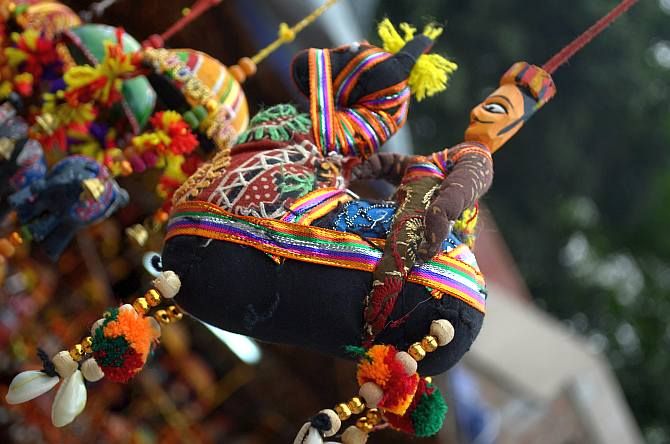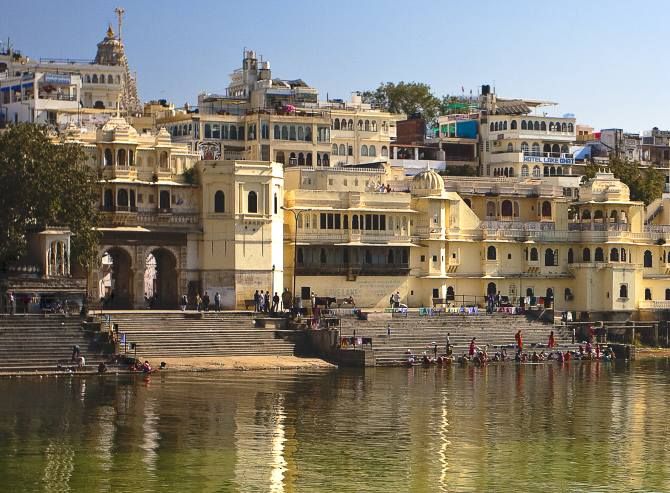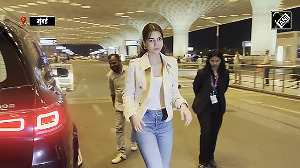A tourist's leisurely experience of this popular Rajasthan city is enriched by a hands-on interaction with its craftspeople

Photograph: Priyambada Nath/Creative Commons
It's two in the afternoon. We're at the Ambrai restaurant in Udaipur, eating a delicious but heavy Rajasthani lunch. It is quiet -- quiet as only warm winter afternoons can be. From across the water, a group of young boys sings, the Western notes of the guitars blending perfectly with the Indianness of the youngsters' tune. They are students, our waiter tells me. "Tourists think that Udaipur's wealth lies in its history," he says. "Today, it lies equally in its youth, many of whom are doing interesting and creative things." Later, we drag ourselves from the Ambrai's terrace before post-prandial lethargy gets the better of us, honestly unable to believe that this lovely but ancient city could have energetic young blood pulsating underneath.
As we walk out of the restaurant towards Hanuman Ghat (since most of the touristy Old City is around Lake Pichola, landmarks here are invariably ghats, or steps leading to the waterfront), we stop in front of an art shop that advertises the Fish Eyes Artisans Walk -- a guided walk to meet some of Udaipur's traditional artisans. Funky artworks adorn the walls and a curly-haired young artist, Nirmal Prajapat, engages us in a convivial chat. "I feel Udaipur has lots to offer other than its palaces," he says with passion. "Travel for me is carefully building experiences and I believe that when tourists interact with local artisans and even try their hand at these crafts, their experience of Udaipur will be enriched by their understanding and empathy for local culture."

Photograph: ¡kuba!/Creative Commons
Early next morning, we head with Nirmal to the home of Devi Lal Kumhar -- the sole potter left in a village of potters. Few others in his community want to practise their traditional craft, he says. But along with his son, Dinesh, he still spends his days on the wheel, supplying to wholesalers rather than engaging in direct retail. Dinesh teaches us to make basic pots on the wheel, giving us life lessons in the process. "Don't use force!" he calls out as my pot collapses in a mess. "You can mould clay better when you're gentle with it." It takes several attempts before I make an imperfect, but intact pot. I am happy.
Next, we head to the workshop of Madan Prajapat, Nirmal's brother. "Miniature art in Mewar dates back to the Maharanas," says the senior artist of miniature paintings. "Artists in those days chronicled the exploits of the Maharanas like photographers do these days." But, he adds, "for it to be a sustainable enterprise today, miniature art has to adapt to modern tastes and times". We look through bundles of his paintings -- they are traditional in execution but have unusual themes. Some are so tiny that we need magnifying glasses to see the details. Next, we have a go with his fine brush (made of squirrel hair, this creates lines thinner than those made with an architect's pencils). Colours blotch and blur as he gently guides us through some simple sketches. "How do you not need spectacles?" I ask laughingly. He smiles, "My eyesight is perfect... moreover, this is what I've been trained to do all my life."
A couple of houses away, we stop briefly to meet a group of young girls working on a zero waste project for Shikshantar, the Udaipur-based research organisation that has replaced the factory model of schooling with self-directed learning. The bright-eyed girls have been working on making baskets from glossy magazines, sturdy enough to hold fruit. They've also designed cardboard furniture, pouches from tetra packs and many other things. Nirmal is also an alumnus of Shikshantar. "I was never interested in school, but loved learning things that interested me, and Shikshantar has enabled me create a niche for myself," he says.
Our trusty auto follows as we walk through Udaipur's winding uphill streets to the puppeteer's colony. I'm delighted to see a bright puppet's stage set up in an open courtyard where Rajuji Bhat and Mukesh Bhat are waiting for us. Glasses of steaming tea in hand, we relive our childhood as the puppets come to life. "The only difference between them and us is that we have beating hearts," says Bhatt, handing the strings of a camel puppet to me. I try to make it walk but evidently it has a mind of its own.
Sadly, puppetry finds few enthusiasts today, and the erstwhile puppeteers now earn a living by adding their unique razzmatazz to posh "destination" weddings in Udaipur. As they describe how they create illusions of grandeur to make ordinary blokes look like kings on their wedding day, it strikes me that even in this new role, they're pulling strings and spinning tales. All one has to do is suspend disbelief, if only momentarily.
Tired but exhilarated by our walk/auto ride through an Udaipur we'd not known existed, we spend the afternoon at Millets of Mewar, arguably the only health food restaurant in a city known for its rich lal maas (mutton cooked with red chillies) and ghee-laden batis (roasted flour dumplings).
Nirmal, clearly a jack-of-all-trades, is a co-founder of this innovative terrace restaurant which has grown from the belief that we are what we eat. "While we were at Shikshantar, we began to realise how the demand for traditional millets and seeds was rapidly shrinking as people's diets focused more on refined grain and sugar," says Manoj Prajapat, who runs the restaurant.
"So, over the years, we've developed vegan and gluten-free recipes using local ingredients for our menu." Gauging from the convivial banter between tables, I gather this is popular as a regular hangout for young travellers.
Sipping ginger lemon tea on the terrace, I watch the sun set over the magnificent palaces around Lake Pichola and marvel at the contrasting images on my camera. They're not all as beautiful as the vista in front of me, but they're images of an Udaipur that is striving to keep itself relevant in today's world. And that's where their charms lie.



.jpg)








 © 2025
© 2025